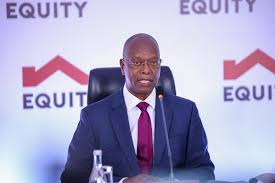Shareholders of Equity Group Holdings Plc have approved the bank’s plans to open a Representative Office in the United Arab Emirates (UAE), marking the first time a Kenyan lender will establish a physical presence in the Middle East. The decision was ratified during the Group’s 21st Annual General Meeting (AGM) held on Wednesday, June 25th, 2025.
This new move will see Equity Bank expand beyond Africa for the first time in its history. The proposed office in Dubai is expected to serve as a key link between East and Central Africa and global markets, especially the Gulf region, India, and South Asia. According to the bank’s management, the hub will strengthen cross-border trade, facilitate remittances, and attract investments in sectors like agribusiness, energy, and infrastructure.
Equity Group Managing Director and CEO, Dr James Mwangi, described the move as strategic for regional and global connectivity. “The UAE office is a strategic bridge that links Africa’s entrepreneurial energy with global capital. Our customers will gain access to new markets. At the same time, Gulf investors will enjoy a direct line into Africa’s fastest-growing region,” Mwangi said.
Chairman of Equity Group Holdings, Prof. Isaac Macharia, added that the Dubai office aligns with the bank’s Africa Recovery and Resilience Plan, which focuses on economic transformation across the continent. He said the expansion demonstrates Equity’s commitment to providing seamless financial services for both African businesses and the global investment community.
The bank expects the Dubai Representative Office to become operational in early 2026, subject to regulatory approvals from both Kenyan and UAE authorities. Once operational, the office will act as a gateway for financial flows and help Equity advance its ambition of becoming Africa’s one-stop financial services platform.
The office will focus on three main pillars:
- Trade facilitation – by offering onsite support for letters of credit and supply-chain finance, Equity intends to reduce settlement delays and make trade faster and more reliable.
- Diaspora banking – targeting the large population of East Africans working in the Gulf region, Equity plans to offer enhanced remittance services, mobile money, and diaspora-friendly banking products.
- Capital raising – the bank aims to be close to sovereign wealth funds and large investment pools in the Gulf to secure long-term funding for major projects in infrastructure, green energy, and development finance in Africa.
The 2025 AGM also covered other key highlights. Shareholders approved a final dividend payout of KSh 16 billion for the 2024 financial year, which translates to KSh 4.25 per share, representing 34% of the bank’s full-year profits. The dividend is expected to be paid on or about 30 June 2025, to shareholders whose names appeared on the company’s register by 23 May 2025.
Additionally, six new board members were appointed at the AGM. The list includes global financial leaders such as Farida Khambata and Nick O’Donohoe, who bring decades of experience in development finance and investment banking. Meanwhile, some retiring directors have been reassigned to the boards of Equity Group’s subsidiaries, to continue supporting the bank’s strategic objectives.
Equity Bank’s expansion to Dubai is seen as a timely and strategic move. With the UAE emerging as a key financial and trade hub, the office could help Kenyan and regional businesses tap into new capital sources, improve access to foreign markets, and facilitate intra-African and intercontinental trade. As one of the leading banking groups in Africa, Equity’s decision also signals confidence in regional integration and a push to deepen Africa–Gulf relations.
The bank’s decision comes at a time when KCB Group and other regional lenders are also eyeing cross-border expansion, especially into newly liberalised markets like Ethiopia. But with Equity being the first to announce an entry into the Middle East, the lender may secure a first-mover advantage in tapping capital and trade links that are crucial for Africa’s economic growth.
